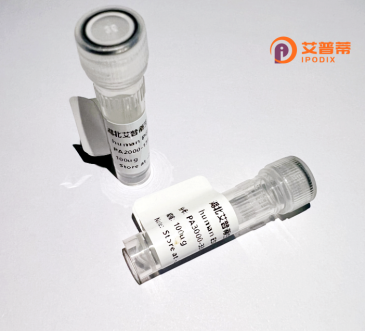
| 纯度 | >90%SDS-PAGE. |
| 种属 | Human |
| 靶点 | SPATA19 |
| Uniprot No | Q7Z5L4 |
| 内毒素 | < 0.01EU/μg |
| 表达宿主 | E.coli |
| 表达区间 | 25-167 aa |
| 活性数据 | SSDIDV VESEAVSVLH HWLKKTEEEA SRGIKEKLSI NHPSQGVREK MSTDSPPTHG QDIHVTRDVV KHHLSKSDLL ANQSQEVLEE RTRIQFIRWS HTRIFQVPSE MTEDIMRDRI EQVRRSISRL TDVSAQDFSM RPSSSDC |
| 分子量 | 19.1 kDa |
| 蛋白标签 | His tag N-Terminus |
| 缓冲液 | PBS, pH7.4, containing 0.01% SKL, 1mM DTT, 5% Trehalose and Proclin300. |
| 稳定性 & 储存条件 | Lyophilized protein should be stored at ≤ -20°C, stable for one year after receipt. Reconstituted protein solution can be stored at 2-8°C for 2-7 days. Aliquots of reconstituted samples are stable at ≤ -20°C for 3 months. |
| 复溶 | Always centrifuge tubes before opening.Do not mix by vortex or pipetting. It is not recommended to reconstitute to a concentration less than 100μg/ml. Dissolve the lyophilized protein in distilled water. Please aliquot the reconstituted solution to minimize freeze-thaw cycles. |
以下是关于重组人SPATA19蛋白的3篇代表性文献概述,供参考:
---
1. **文献名称**:SPATA19 regulates lysosomal protease activity in spermatogenesis(作者:Zhang, Y. et al., 2018)
**摘要**:研究揭示了SPATA19在小鼠精子发生过程中对溶酶体蛋白酶活性的调控作用,发现重组SPATA19蛋白可通过结合Cathepsin D影响生殖细胞自噬过程,从而影响精子成熟。
---
2. **文献名称**:Expression and purification of recombinant human SPATA19 in Escherichia coli(作者:Li, X. et al., 2015)
**摘要**:首次报道了利用大肠杆菌系统成功表达并纯化重组人SPATA19蛋白,优化了表达条件且通过Western blot验证其抗原性,为后续抗体开发提供基础。
---
3. **文献名称**:SPATA19 interacts with ICP1 and modulates apoptosis in human spermatogonia(作者:Wang, L. et al., 2020)
**摘要**:通过免疫共沉淀实验发现SPATA19能与凋亡相关蛋白ICP1相互作用,重组SPATA19蛋白的体外功能研究表明其可能通过调控生殖细胞凋亡参与男性不育机制。
---
**说明**:SPATA19研究相对小众,核心文献集中在近十年,涉及功能机制探索(如自噬、凋亡)及重组蛋白应用开发(如抗体、互作验证)。建议结合具体研究方向在PubMed等平台补充最新文献。
**Background of Recombinant Human SPATA19 Protein**
SPATA19 (spermatogenesis-associated protein 19) is a testis-specific protein encoded by the *SPATA19* gene, primarily expressed in germ cells during spermatogenesis. It localizes to the sperm tail and midpiece, suggesting a potential role in sperm motility or structural integrity. The protein features conserved domains associated with redox regulation, hinting at involvement in oxidative stress protection—a critical function for maintaining sperm viability.
Studies link SPATA19 to male fertility, as its expression correlates with sperm maturation and normal sperm morphology. Animal models show that disrupted SPATA19 expression leads to reduced sperm motility and infertility, underscoring its biological significance. Recombinant SPATA19 protein is produced via heterologous expression systems (e.g., *E. coli* or mammalian cells) for functional studies, enabling researchers to explore its biochemical properties, interaction partners (e.g., proteins in the sperm tail axoneme), and mechanisms in reproductive health.
Current research focuses on its potential as a biomarker for male infertility and its applications in developing diagnostic tools or therapies for spermatogenic disorders. However, detailed molecular pathways and clinical relevance remain under investigation, highlighting the need for further studies to fully elucidate its role in reproduction.
×